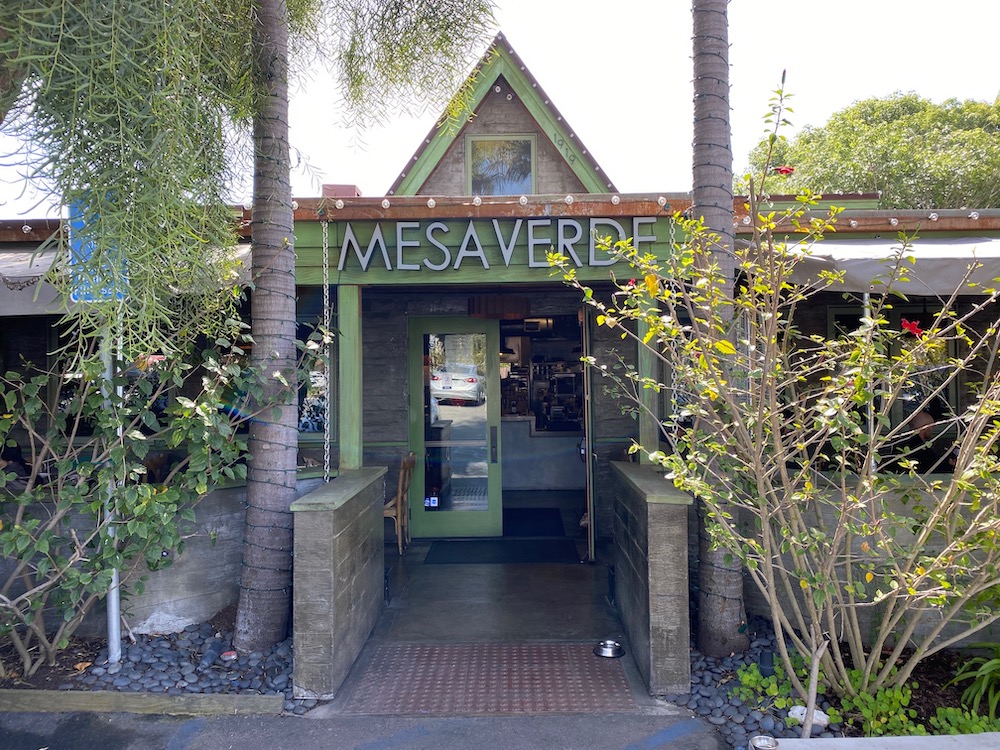••• Mission Refill, which “helps reduce single-use plastic consumption by allowing customers to bring their own containers to fill up on dozens of household goods,” has opened in Goleta’s Calle Real Shopping Center. —KEYT (photo courtesy Mission Refill)
••• “Tajiguas Landfill, in a canyon on the Gaviota Coast that accepts trash and recyclables from Summerland to Buellton, is outgrowing its borders. A draft subsequent environmental impact report seeks to increase the facility by 14.25 acres, which should extend its life by two years, to 2038.” —Independent
••• “New Bike Lanes Approved for Middle of Santa Barbara’s State Street […] City Council Votes to Spend $55,000 to Paint Not-Green Lanes Down Eight Blocks of City’s Main Drag.” —Independent
••• “The group that installed debris nets in the canyons above Montecito in the wake of the deadly 2018 debris flows has decided to remove the devices after failing to reach a financial agreement with Santa Barbara County for their future maintenance and upkeep.” —Noozhawk
••• “Is UC Santa Barbara’s Dormzilla DOA? […] University Says It Plans to Build 2,250-Bed Student Housing Project at Site Reserved for Munger Hall.” —Independent
••• “The lawsuit over the fate of the Modoc Road Multi-Use Path […] appears to be mostly resolved, with design of the controversial bikeway about 35 percent completed. As part of the settlement agreement, plans for the bikeway […] minimize the number of Canary palm and eucalyptus trees along Modoc Road slated for destruction. In addition, county engineers have agreed to construct the new pathway as close to the existing asphalt infrastructure as feasible to avoid encroaching on a land preserve that had been initially secured to prevent any development on the site in perpetuity. County engineers also agreed they would use no ‘hot mix concrete’ in the construction of the pathway but would instead use a more environmentally sensitive paving material suggested by opponents of the pathway.” —Independent
••• “There’s outrage in the environmental community over word that [Pacific Pipeline Company, a subsidiary of ExxonMobil] has withdrawn plans to build a new oil pipeline in Santa Barbara County, and will instead try to rebuild one which caused a major spill in 2015. A section of the Plains All-American Pipeline ruptured near Refugio State Beach in 2015, spilling more than 140,000 gallons of oil onto the coastline. The pipeline has been closed since, idling three ExxonMobil oil platforms off the county’s coast.” —KCLU
••• The New York Times looks at “the proposed Chumash Heritage National Marine Sanctuary, a yearslong effort spearheaded by the Northern Chumash, a tribe that has inhabited this coastline for thousands of years. The 7,573-square-mile sanctuary would include 156 miles of coastline between the towns of Cambria and Gaviota and link the Greater Farallones and Monterey Bay National Marine Sanctuaries to the north and the Channel Islands National Marine Sanctuary to the south, creating a chain of conservation of more than 20,000 square miles. The new designation would limit offshore oil drilling, acoustic underwater testing and other activities in the area, while providing funding for research and protection to numerous Chumash sacred sites, both on and offshore. […] Now, after years of work, the sanctuary is nearing the final stages of the designation process. But NOAA has thrown a late wrench in the plans. In an effort to allow for the development of an offshore wind energy project, NOAA is now suggesting shifting the sanctuary’s borders to remove a section of the coastline that includes Morro Bay and Morro Rock.”
••• Edhat‘s tree of the month: “Soapbark Tree was introduced into California in the late 1800s. While it is perfectly suited to our Mediterranean climate, only a few currently stand in Santa Barbara, primarily as street trees. Its common name of Soapbark Tree refers to a compound, glycoside saponin, found in its bark. When water is added to it, this compound will create a lovely soft foam; as a result, it has long been used as a substitute for harsh lye-based soaps.”
••• And a national story of local interest: “A federal jury ruled on Tuesday that the powerful National Association of Realtors and several large brokerages had conspired to artificially inflate the commissions paid to real estate agents, a decision that could radically alter the home-buying process in the United States. […] It’s a decision that has the potential to rewrite the entire structure of the real estate industry in the United States, lowering the cost of moving homes by reducing commissions. […] N.A.R. said it plans to appeal the verdict.” —New York Times
················
Sign up for the Siteline email newsletter and you’ll never miss a post.


















Nice to know that the cabal that is real estate brokerage industry is finally facing its reckoning. The fees and costs associated with selling a 7 or 8 figure home these days are so far out of line with the actual work. It takes almost no skill or effort to sell a property these days. Just a few dozen photos (by a photographer, not an agent), a few dozen clicks by anyone with any semblance of tech skills, and the home is available for everyone to see and discover. There is value to a good agent, but it’s not nearly the reward. It’s time to gut the commission all together and pay the agents by the hour. Like every other profession. Or at the very least, cut it down to something inline with the rest of the world – 3%.
Hopefully the MLS and its monopolistic collusion is next in this series of ginormous civil suits. I imagine the lawyers are circling them as well… And let’s not forget the title companies.
It’s been a good run for the agents and brokers, but the industry is due for a reckoning. It’s time for them to be paid an appropriate payment for their time and skills. To be forced into the market conditions they love to quote when their talking about price and value…
Please publish one of MANY articles that speak about the HORROR the wind farm expected in Morro Bay, please Lso publish the mock up of the complete picture that will be Avila/Port San Luis
Here is a link to wind farm
https://calmatters.org/environment/2023/10/california-offshore-wind-central-coast/
So, the debris nets are to be removed. Will the county they replace them with new nets that they will maintain? What?
I don’t usually comment on these boards, but I just had to jump in on this one. Sam, I’ve watched your comments for a while, and it seems you, and a couple of other people, like to dump on the real estate industry. Not sure if it’s because you had a bad experience, or you’re just trying to appear relevant. A quick Google Search doesn’t show you own a home in Santa Barbara, so not sure what you’re basing your comments on. If you want to appear informed, there are a few things you should know: 1) Your use of the word cabal to describe the real estate industry is a bit sensationalized. 2) If you actually followed the articles on the NAR lawsuit, as I have, you would understand that the plaintiff’s attorney did NOT actually prove anti-trust or “a conspiracy”. He has just been using the Trump playbook of putting out false facts to try to sway public opinion. 3) In California, listing contracts signed with the seller have the words “COMMISSIONS ARE NOT SET BY LAW. THEY ARE NEGOTIABLE” in larger, bold print, so the idea of a conspiracy among brokers is BS. Since you don’t appear to own real estate in this town, you probably wouldn’t know that. 4) The lawsuit focused on the fact that Listing Agents share their commissions with the agents of the buyers. Here’s what happens if that option goes away: Under current lending rules, buyers who are already stretching to come up with a down payment won’t be able to hire representation, because the lenders won’t roll the fees they pay their agents into their loan, which will put a large portion of buyers out of the market; Those that can afford to pay their agents will probably deduct that amount, or the amount of buying power they lose, from their offer. In either case, it will probably cost the seller as much, or more than if they offered a cooperating broker commission. 5) I know of agents in other states charging more than agents here charge. Yes, agents in other countries charge less, but there is no broker cooperation in a lot of those cases. In other words, in those instances, the only way you can buy a house is from the listing agent, which means you would have to contact the listing agents of each property you want to see, and hope they aren’t only working for the seller.
Let’s look at other professions that don’t have guaranteed income: Ask any attorney to take a case on contingency, and it will probably cost you 30% or more (many times more than the commissions real estate agents charge), and that’s not split with the other attorney. Some attorneys (like probate attorneys), say their fees are fixed by the court. Really? In California, if an agent says their fees are fixed, they lose their license, get fined, and could conceivably go to jail. How about other business you probably deal with? Your insurance agent gets paid every time your insurance renews. How much do you tip your server when you go out to dinner? 15-25%? That’s a kind of contingency commission. Call local plumbers or electricians, get their prices. Now, consider union workers. That’s a clear example of incoming fixing, but nobody seems to get mad at that. Ask any of these professions if they’ll work for half. Everyone has the right to work for what they feel they are worth, even you. And home sellers are free to choose whatever agent they want to, or try to sell themselves. Yes, you can Google real estate contracts, but you can also Google legal documents and try to go at it on your own. There are statistics on how well that works.
Finally, your comment that agents don’t do anything to earn their fees is just ignorant. First of all, agents are self-employed, and work on a contingency basis, which means they can spend a LOT of time and money with no guarantee of getting paid. Assuming you have a job, would you go to work if you weren’t assured you were going to get paid? Agents do. And they have to pay National, State and Local Association dues, annual Errors and Omissions Insurance, their own health insurance, advertising, gas, phone, supplies, office space…the list goes on. And if they DO make money, they have to pay both sides of their social security taxes. Additionally, any money they make gets divided up with their brokerage. Agents in big firms also undergo constant training, and their transactions are constantly under audit. Even when the market was hot, agents would have to decipher multiple offers, do due diligence on buyers and agents, and advise their clients on the best options. So when you say there is a cabal of conspiring agents out there, I don’t what the hell you’re talking about. Clearly, you need to be more informed before you comment.
If a $10 Million home sells in 2 days and a $2M home sells in 2 days, and they both close in 14 days because they are cash sales with no contingencies, why is there such a massive spread in how much the agent makes? The % of sale model doesn’t make sense – especially in a robust housing market.
db, I agree that the system isn’t perfect, but that’s not what my argument was. My argument was that Sam insulted an entire industry based on his obvious dislike of that industry, combined with erroneous or incomplete information. While I did compare the 30% fees that can be charged by attorneys on contingency cases to what agents make (before they share their fees), my main comments weren’t about percentages, although I did drift into that lane…they were about whether or not over 1.5 million real estate agents, and their brokerages, collectively conspired to fix real estate commissions, thereby creating a cabal. They didn’t. Again, it clearly states in California listing contracts that commissions are negotiable. End of story. Agents can ask to be paid what they feel is a fair amount, based on their costs, level of experience, and what they bring to the table, just as anyone can when applying for a job. Some agents provide a very high level of expertise and service, some don’t. If the employer (the seller) doesn’t see the value, they don’t need to hire that agent, just like you don’t have to hire a vendor or tradesperson you don’t see value with. No cabal.
Back to your comment about paying an agent if the house sells quickly: I recently sold a house, and was happy to pay the agent a full commission, even though my house literally sold on the first day. Why? Because I saved at least 1-2 months of holding costs, the aggravation of having strangers come in and out of my house for weeks…maybe months, and most importantly, and the uncertainty whether my buyer would be able to obtain insurance if I sat on the market too long, or of how rising interest rates, which effect everyone in some way, even cash buyers, would affect the marketable value of my home. Whether my house was a $2M house of a $10M house, the peace of mind I got because my agent did their job (sold my house quickly, and for top dollar) was worth it to me. The higher the value of my home, the higher the value of my time. My agent saved me time, and I looked at the big picture.
Following up on your statement about agents being overpaid in a robust market, would you then agree to pay more in a slower market, where advertising bills, expenses, and time value hours add up?
As I said in the beginning, I agree with you that the system isn’t prefect, but show me one that is. Are you happy having your taxes go toward hiring inept people who can’t get fired because of their unions, or because they make the rules that they work under? I know a lot of agents, and they are among the hardest working people I know…taking calls late at night, on weekends, from hospitals…even on their vacations and honeymoons. All without the guarantee of getting a pay check. I certainly wouldn’t take that on.